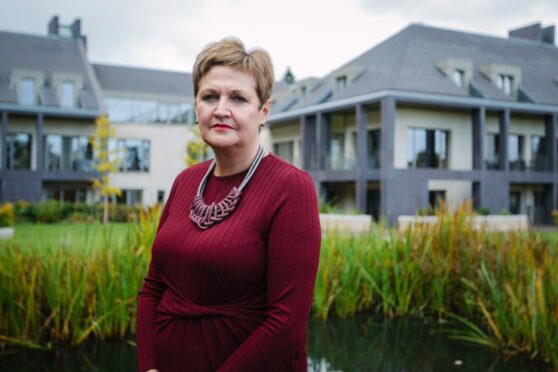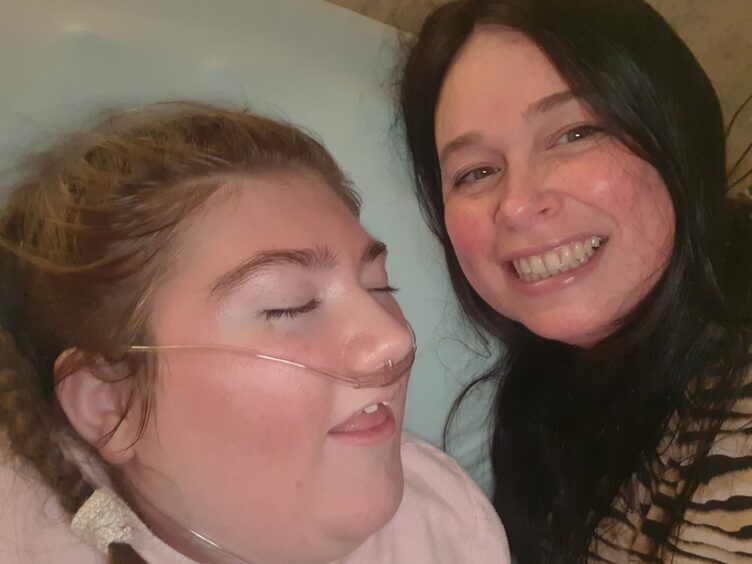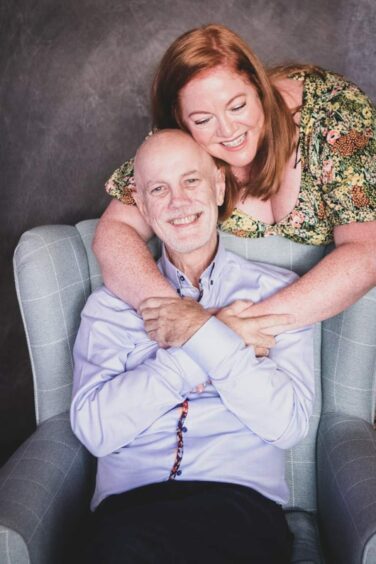
Hospices across Scotland are being forced to cut beds and services as soaring energy prices push them to the brink.
Some hospices – which support 22,000 Scots families a year – have seen energy bills rise five-fold, with payments to hospices under the UK Government’s energy support scheme about to fall in April.
The cost of providing hospice care was almost £90 million a year in Scotland, but spiralling energy and staffing costs are adding millions of pounds more, leaving organisations on the brink.
Hospice managers hope to meet Health Minister Humza Yousaf next month to discuss the funding crisis.
Helen Malo, of industry body Hospice UK, which represents Scotland’s 16 hospices, said: “Some hospices have seen their energy bills rocket to five times higher than they originally were.
“There have also been huge increases in staffing costs because of recent NHS pay deals on top of other cost of living bills.
“At the same time, fundraising is of serious worry because not only do the public have their own cost of living concerns, charity shops which used to provide a stream of income are now struggling. A number are not even making enough to pay energy bills.
“Things are about to get even worse because, in April, the UK Government energy support scheme reduces so hospices will only receive the same level of support that cafe and shops get – which is even less than zoos or museums. I know some hospices in Scotland have already lost a number of beds. Others are facing very hard choices about the level of services they can continue provide to families.”
Hospices may need to raise an extra £10m this year just to stand still, and Malo added: “The public may not realise we are not fully funded by government, but that is why hospices depend on charity donations and legacies covering two thirds of our running costs.
“But legacies have dropped over the last three years, and fundraising opportunities are difficult in the current financial climate. We now need to have hard conversations about future funding, particularly as the need for our services will increase by 2040 to a predicted additional 10,000 people needing palliative care.
“If hospices weren’t here the NHS would be facing paying 100% of the costs of caring for those patients.”
Funding hospices receive through local government health and social care partnerships covers around a third of their costs, leaving them to raise the rest themselves.
Before health and social care partnerships (HSCPs) were established, hospice services were funded 50% by health boards. But when the change came, the terms of reference changed so the partnerships only funded “agreed” costs.
There is no strict formula. There is a service level agreement between each hospice and HSPC to give a block grant based on the amount of services they supply rather than cost per patient.
Among the services at risk is hospice at home, also used by thousands of families each year.
In many areas this highly specialised service receives no funding at all, despite government moves to allow more people to choose to die at home and the huge pressure it removes from the NHS at a time when hospitals are struggling to find beds. Strathcarron Hospice CEO Irene McKie said an increasing number of families want to access hospice care at home, but because the charity receives no funding to provide that service, they struggle to help.
McKie said: “It’s incredibly frustrating. More and more people want the choice to die at home, and we want to provide the expert service and support which allows them to do that. But despite everyone agreeing that the service we provide is not only excellent, and it is also good value for money, there has been no offer of increased funding to allow us to fund that service or allow us to expand to meet demand.
“Last year we cared for around 400 people a week at home. That is as many as we cared for in the hospice setting.
“The Scottish Government carried out an evaluation on the hospice at home service and said we were saving them the equivalent of six bed days per patient.
“While they praised the scheme, no funding for it means we have been unable to expand the service the way we want to.”
McKie warned rising prices and government funding changes which now only covered “agreed costs” have had a major negative impact on finances.
She said: “We need to raise around £102,000 a week to keep operating at the current level. We face £600,000 additional running costs this year alone. To further reduce our costs, we would have to cut or reduce services.”
Rhona Baillie, chief executive of the Prince and Princess of Wales Hospice in Glasgow, is hoping government funding will increase to 50% to cover the massive energy bill increases and growing staffing costs. She said: “We need £5 million each year to continue caring for around 1,200 patients with our 170 staff. We get £2m funding and we have to raise £3m ourselves.
“There are huge financial issues for all of us at the moment. Our energy bills have gone up by 60%, and we also have to keep up with the NHS pay awards to ensure we keep our staff. Food costs have rocketed too.
“At the same time, the public are facing their own cost of living increases which makes fundraising very difficult. We would like to be able to offer hospice care at home too, but that is expensive. If we had funding, it’s something I’d like to be able to offer patients who want it.”
Gordon McHugh, chief executive of Scotland’s newest hospice, Kilbryde, in East Kilbride, says his electricity bills have rocketed.
He said: “They used to be around £25,000. Now they are over £80,000. It’s a huge additional sum for us to cover with bucket collections, but we have no choice. We have to raise £2.6 million just to break even.
“Our charity shops used to be a strong source of income. But we are finding the additional energy costs of running them mean we sometimes don’t even cover that and they can end up costing us money. We are facing a very serious situation.
“The situation everyone is in means hospices face having to make some unprecedented decisions.
“If we were not here providing the service that we currently do, there would be a major impact on the already overstretched NHS who would then have to care for the thousands of families who use us.”
Scottish Conservative Shadow Social Justice Minister Miles Briggs said: “I’ve been working with hospice officials for some time now and it is quite clear that some are teetering on the brink as mounting energy and staffing costs are pushing them over the edge.”
The Scottish Government said: “The First Minister has committed to ensuring that specific conversations take place about the pressures that hospices are facing, and that officials and ministers liaise with the sector to see what more support we might be able to provide.
“The significant cut by the UK Government in support for non-domestic consumers with their energy costs beyond March is very concerning, particularly for the more vulnerable sectors.
“Scottish ministers wrote to the UK Government at the end of last year to express our disappointment at the lack of opportunity we had to engage in the review of the Energy Bills Relief Scheme and to stress that any continued support should be aimed at those businesses and sectors who need it the most.
“We will continue to work with stakeholders to analyse the impact of this reduced level in support upon non-domestic consumers and raise our concerns with the UK Government at every opportunity we get.”
In numbers
- 22,400 people were supported by hospices last year
- An additional 10,000 people will need palliative care by 2040
- 61,400 visits were made to people in their own homes
- 19,000 people received direct clinical care
- 465 children and babies received hospice care
- The cost was almost £90 million a year
- 2,700 families received bereavement support
- Energy bills and extra staffing costs will push costs to £100 million
- Government funding generally covers just a third of costs
- Hospice charities currently fundraise over £60 million just to keep going
We depend on children’s hospice. Without them we couldn’t keep going
Bus driver Matthew Caldwell spent his working life driving children with special needs and the elderly disabled around his home town of East Kilbride.
But, after being diagnosed with cancer, he is receiving end-of-life care at Kilbryde Hospice, surrounded by his wife and family.
Matthew, 62, was initially diagnosed with bowel cancer, but the disease spread and he was admitted to the hospice two weeks ago.
His daughter, Lois McCartan, 36, said: “As dad was becoming more ill and frail, he was falling at home. We were constantly worried about him until it was deemed that he was unsafe at home, and he was moved to the hospice.
“That was a huge pressure lifted from our shoulders. We knew he would receive all the complex treatment he needed, and unrivalled round-the-clock constant care.
“This has allowed us to spend the precious time we have left with my dad in a safe, calm environment where we don’t need to worry about rushing around getting prescriptions or trying to arrange out-of-hours doctor appointments.
“We can just be with him. Knowing he is receiving all the specialist care he needs at the touch of a button has given us peace of mind.
“It has given all of us the opportunity to come to terms with what lies ahead, it’s given dad the dignity he deserves and it has allowed us to remain in this safe little cocoon where we feel supported by all the incredible staff at the hospice.
“It’s been very difficult for my mum, Heather. Her and dad have been together for 42 years and losing her life partner has taken a terrible toll.
“But having this time together in the hospice has allowed them to get their
affairs in order and to be with each other in a caring environment where she knows dad will get all the help he needs to remain comfortable.
“I simply don’t know what we would have done without the support and care we’ve received from Kilbryde.
“I was shocked to learn that they don’t receive full funding for all the vital care they provide, and I would ask politicians to think again and properly support the hospice service across the country.”
The hospice has given dad all the dignity he deserves and all the care he needs
Bus driver Matthew Caldwell spent his working life driving children with special needs and the elderly disabled around his home town of East Kilbride.
But, after being diagnosed with cancer, he is receiving end-of-life care at Kilbryde Hospice, surrounded by his wife and family.
Matthew, 62, was initially diagnosed with bowel cancer, but the disease spread and he was admitted to the hospice two weeks ago.
His daughter, Lois McCartan, 36, said: “As dad was becoming more ill and frail, he was falling at home. We were constantly worried about him until it was deemed that he was unsafe at home, and he was moved to the hospice.
“That was a huge pressure lifted from our shoulders. We knew he would receive all the complex treatment he needed, and unrivalled round-the-clock constant care.
“This has allowed us to spend the precious time we have left with my dad in a safe, calm environment where we don’t need to worry about rushing around getting prescriptions or trying to arrange out-of-hours doctor appointments.
“We can just be with him. Knowing he is receiving all the specialist care he needs at the touch of a button has given us peace of mind.
“It has given all of us the opportunity to come to terms with what lies ahead, it’s given dad the dignity he deserves and it has allowed us to remain in this safe little cocoon where we feel supported by all the incredible staff at the hospice.
“It’s been very difficult for my mum, Heather. Her and dad have been together for 42 years and losing her life partner has taken a terrible toll.
“But having this time together in the hospice has allowed them to get their
affairs in order and to be with each other in a caring environment where she knows dad will get all the help he needs to remain comfortable.
“I simply don’t know what we would have done without the support and care we’ve received from Kilbryde.
“I was shocked to learn that they don’t receive full funding for all the vital care they provide, and I would ask politicians to think again and properly support the hospice service across the country.”

Enjoy the convenience of having The Sunday Post delivered as a digital ePaper straight to your smartphone, tablet or computer.
Subscribe for only £5.49 a month and enjoy all the benefits of the printed paper as a digital replica.
Subscribe © SYSTEM
© SYSTEM © SYSTEM
© SYSTEM